How to stop getting notifications from powerupdevice.co.in
Notification SpamAlso Known As: Ads by powerupdevice.co.in
Get free scan and check if your device is infected.
Remove it nowTo use full-featured product, you have to purchase a license for Combo Cleaner. Seven days free trial available. Combo Cleaner is owned and operated by RCS LT, the parent company of PCRisk.com.
What kind of page is powerupdevice.co[.]in?
We found that powerupdevice.co[.]in hosts deceptive content and attempts to gain notification permissions from users. If allowed, it can deliver untrustworthy notifications designed to promote potentially malicious websites. Therefore, users should close the site if they ever land on it.
![powerupdevice.co[.]in ads](/images/stories/screenshots202506/powerupdevice-co-in-ads-main.jpg)
Powerupdevice.co[.]in in detail
Once visited, powerupdevice.co[.]in presents a fake reCAPTCHA and implies that visitors have to tick a checkbox to prove that they are not robots. After that, the site instructs visitors to click "Allow" to confirm that they are not robots. However, doing so grants it permission to show notifications.
Notifications from powerupdevice.co[.]in can include fake alerts claiming that the McAfee license has expired and urging users to click the provided link to stay protected online ("activate protection"). It is important to mention that McAfee is a legitimate security tool, and these notifications are not coming from it.
Interacting with warnings, offers, or other notifications from powerupdevice.co[.]in can lead users to phishing websites (or similar scams) designed to steal personal information. These notifications can also take users to sites crafted to steal money from users or trick them into downloading potentially harmful software.
Overall, agreeing to get notifications from powerupdevice.co[.]in may lead to various issues, including computer infections, identity theft, and monetary loss. Thus, it is highly advisable not to allow powerupdevice.co[.]in to send notifications and remove this permission if it is already granted.
| Name | Ads by powerupdevice.co.in |
| Threat Type | Push notifications ads, Unwanted ads, Pop-up ads |
| Detection Names | Seclookup (Malicious), Sophos (Suspicious), Full List Of Detections (VirusTotal) |
| Serving IP Address | 108.62.60.42 |
| Symptoms | Seeing advertisements not originating from the sites you are browsing. Intrusive pop-up ads. Decreased Internet browsing speed. |
| Distribution Methods | Deceptive pop-up ads, false claims within visited websites, unwanted applications (adware) |
| Damage | Decreased computer performance, browser tracking - privacy issues, possible additional malware infections. |
| Malware Removal (Windows) |
To eliminate possible malware infections, scan your computer with legitimate antivirus software. Our security researchers recommend using Combo Cleaner. Download Combo CleanerTo use full-featured product, you have to purchase a license for Combo Cleaner. 7 days free trial available. Combo Cleaner is owned and operated by RCS LT, the parent company of PCRisk.com. |
More on similar pages
Users often end up on websites like powerupdevice.co[.]in without intending to. This typically happens after clicking deceptive ads, fake download buttons, or other misleading elements found on untrustworthy websites. Torrent sites, illegal movie streaming pages, and similar platforms that use rogue advertising networks can also lead users to these sites.
In some cases, adware installed on the system may also generate ads that redirect users to such pages. Additionally, users may be directed to these sites through misleading links received in emails. More examples of similar websites are coliatang[.]com, trewomodic[.]com, and rattabless[.]com.
How did powerupdevice.co[.]in gain permission to deliver spam notifications?
Usually, users agree to receive notifications from websites by clicking "Allow", "Allow Notifications", or a similar option while visiting them. Since websites cannot display notifications without permission, it indicates that powerupdevice.co[.]in has been permitted to deliver them.
How to prevent deceptive sites from delivering spam notifications?
When a dubious web page wants to show notifications, click the "Block", "Block Notifications", or "Deny" button to reject the request or simply close the page. Note that trustworthy websites do not claim that visitors have to click "Allow" to access their content or verify that they are not robots. If you are receiving unwanted notifications, we recommend running a scan with Combo Cleaner Antivirus for Windows to automatically eliminate them.
Appearance of powerupdevice.co[.]in website (GIF):
![powerupdevice.co[.]in website appearance (GIF)](/images/stories/screenshots202506/powerupdevice-co-in-ads-appearance.gif)
Notification from powerupdevice.co[.]in:
![powerupdevice.co[.]in notification](/images/stories/screenshots202506/powerupdevice-co-in-ads-notification.jpg)
Instant automatic malware removal:
Manual threat removal might be a lengthy and complicated process that requires advanced IT skills. Combo Cleaner is a professional automatic malware removal tool that is recommended to get rid of malware. Download it by clicking the button below:
DOWNLOAD Combo CleanerBy downloading any software listed on this website you agree to our Privacy Policy and Terms of Use. To use full-featured product, you have to purchase a license for Combo Cleaner. 7 days free trial available. Combo Cleaner is owned and operated by RCS LT, the parent company of PCRisk.com.
Quick menu:
- What is Ads by powerupdevice.co.in?
- STEP 1. Remove spam notifications from Google Chrome
- STEP 2. Remove spam notifications from Google Chrome (Android)
- STEP 3. Remove spam notifications from Mozilla Firefox
- STEP 4. Remove spam notifications from Microsoft Edge
- STEP 5. Remove spam notifications from Safari (macOS)
Disable unwanted browser notifications:
Video showing how to disable web browser notifications:
 Remove spam notifications from Google Chrome:
Remove spam notifications from Google Chrome:
Click the Menu button (three dots) on the right upper corner of the screen and select "Settings". In the opened window select "Privacy and security", then click on "Site Settings" and choose "Notifications".
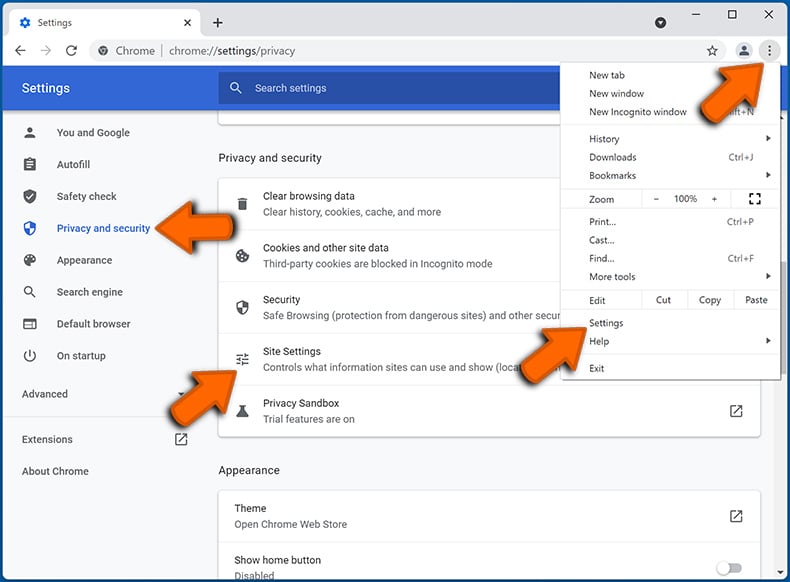
In the "Allowed to send notifications" list search for websites that you want to stop receiving notifications from. Click on the three dots icon near the website URL and click "Block" or "Remove" (if you click "Remove" and visit the malicious site once more, it will ask to enable notifications again).
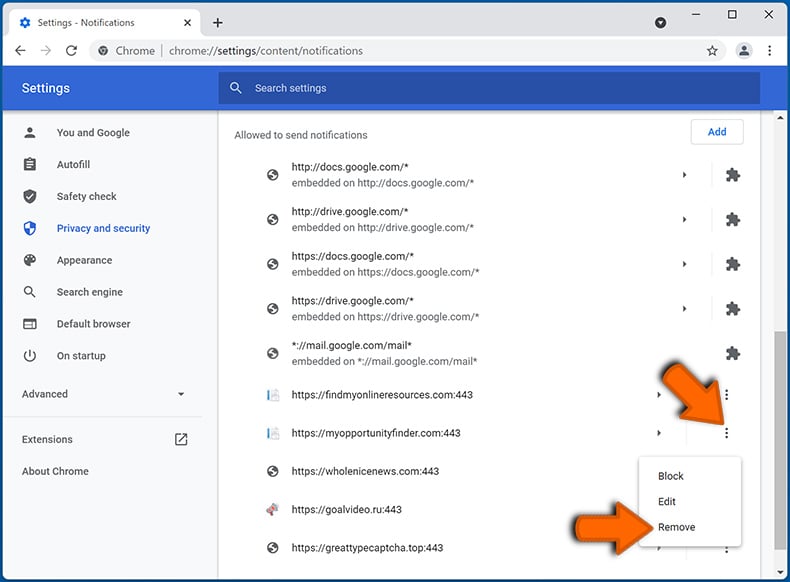
 Remove spam notifications from Google Chrome (Android):
Remove spam notifications from Google Chrome (Android):
Tap the Menu button (three dots) on the right upper corner of the screen and select "Settings". Scroll down, tap on "Site settings" and then "Notifications".
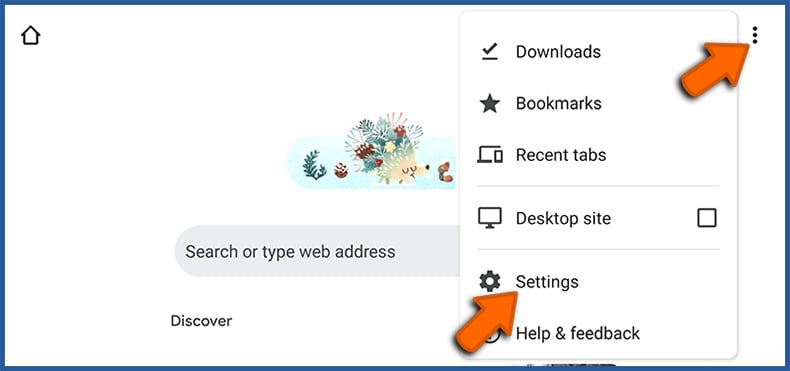
In the opened window, locate all suspicious URLs and tap on them one-by-one. Once the pop-up shows up, select either "Block" or "Remove" (if you tap "Remove" and visit the malicious site once more, it will ask to enable notifications again).
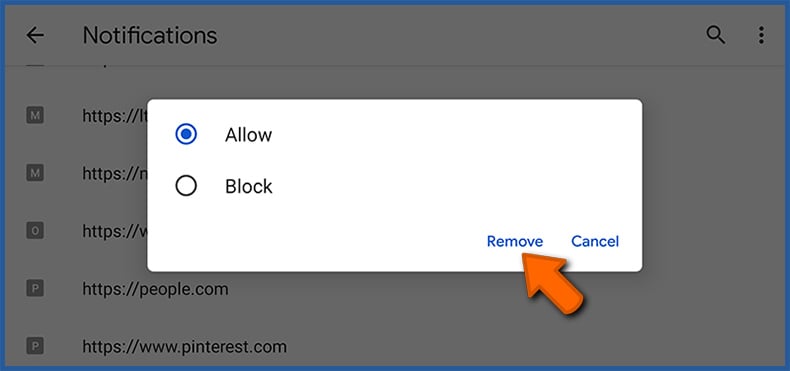
 Remove spam notifications from Mozilla Firefox:
Remove spam notifications from Mozilla Firefox:
Click the Menu button (three bars) on the right upper corner of the screen. Select "Settings" and click on "Privacy & Security" in the toolbar on the left hand side of the screen. Scroll down to the "Permissions" section and click the "Settings" button next to "Notifications".
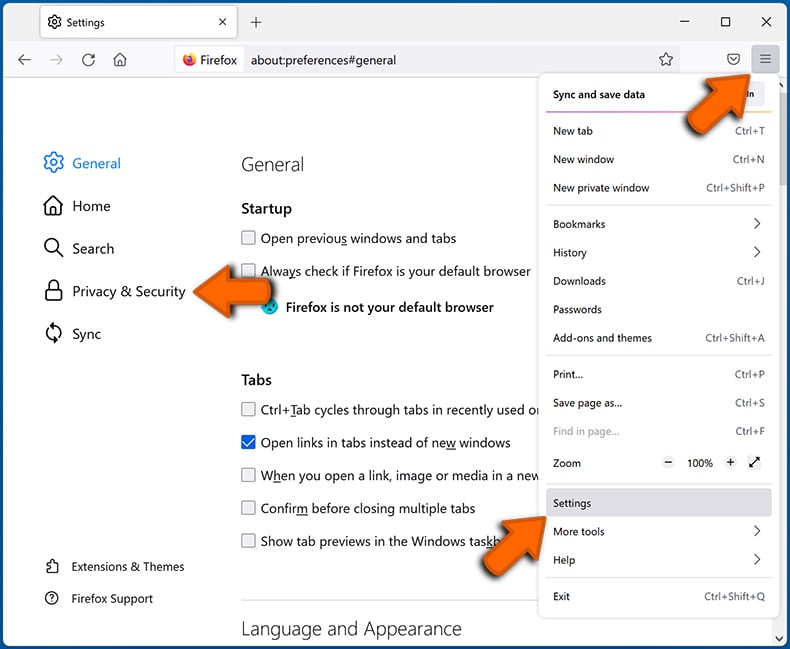
In the opened window, locate all suspicious URLs and block them using the drop-down menu or either remove them by clicking "Remove Website" at the bottom of the window (if you click "Remove Website" and visit the malicious site once more, it will ask to enable notifications again).
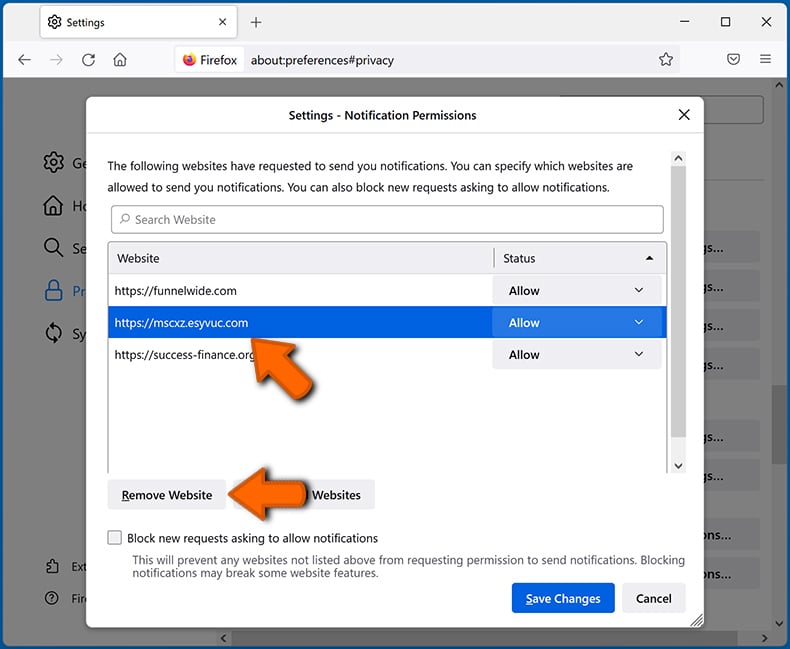
 Remove spam notifications from Microsoft Edge:
Remove spam notifications from Microsoft Edge:
Click the menu button (three dots) on the right upper corner of the Edge window and select "Settings". Click on "Cookies and site permissions" in the toolbar on the left hand side of the screen and select "Notifications".
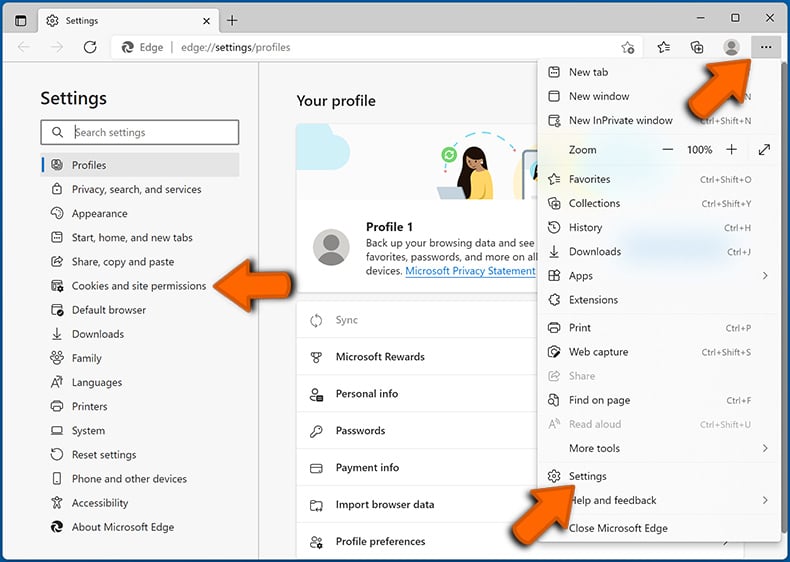
Click three dots on the right hand side of each suspicious URL under "Allow" section and click "Block" or "Remove" (if you click "Remove" and visit the malicious site once more, it will ask to enable notifications again).
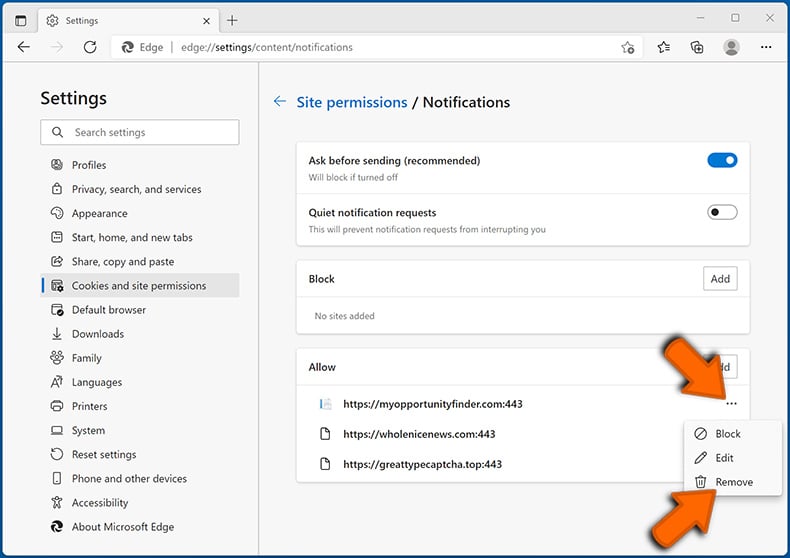
 Remove spam notifications from Safari (macOS):
Remove spam notifications from Safari (macOS):
Click "Safari" button on the left upper corner of the screen and select "Preferences...". Select the "Websites" tab and then select "Notifications" section on the left pane.
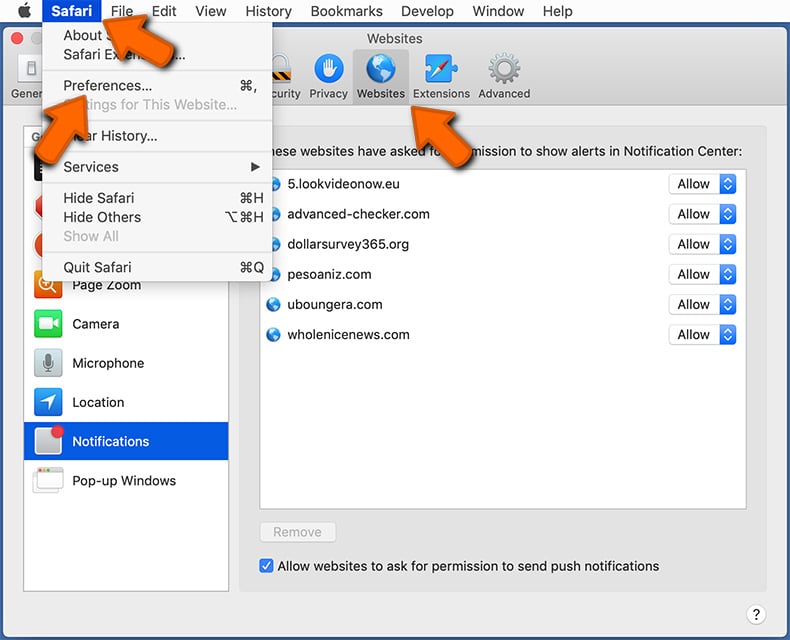
Check for suspicious URLs and apply the "Deny" option using the drop-down menu or either remove them by clicking "Remove" at the bottom of the window (if you click "Remove" and visit the malicious site once more, it will ask to enable notifications again)
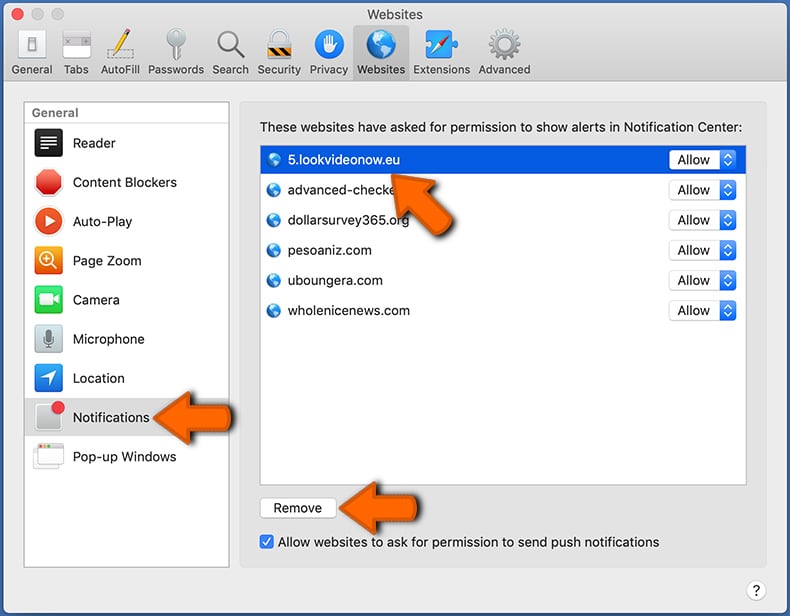
How to avoid browser notification spam?
Internet users should be very skeptical when being asked to allow notifications. While this is a useful feature that allows you to receive timely news from websites you like, deceptive marketers frequently abuse it.
Only allow notifications from websites that you fully trust. For added security - use an anti-malware application with a real-time web browsing monitor to block shady websites that tries to trick you into allowing spam notifications. We recommend using Combo Cleaner Antivirus for Windows.
Frequently Asked Questions (FAQ)
Why am I seeing ads (browser notifications) delivered by powerupdevice.co[.]in in the right lower corner of my desktop?
Before a website can send browser notifications, it must receive the user's consent. If you are seeing notifications from powerupdevice[.]co.in, it is an indication that permission has been granted by clicking "Allow" or a similar option while visiting the site.
I have clicked on notification ads, is my computer infected?
Notifications cannot infect computers. However, if they are sent from dubious websites, they can lead users to malicious pages.
Is powerupdevice.co[.]in a virus?
Websites like powerupdevice.co[.]in are not viruses. Typically, they are designed to promote other websites of this kind, various scams, and questionable software.
Will Combo Cleaner remove powerupdevice.co[.]in ads automatically or manual steps are still required?
Yes, Combo Cleaner will scan your system, revoke any permissions granted to powerupdevice[.]co.in, and block future attempts to access it. No further action will be needed.
Share:

Tomas Meskauskas
Expert security researcher, professional malware analyst
I am passionate about computer security and technology. I have an experience of over 10 years working in various companies related to computer technical issue solving and Internet security. I have been working as an author and editor for pcrisk.com since 2010. Follow me on Twitter and LinkedIn to stay informed about the latest online security threats.
PCrisk security portal is brought by a company RCS LT.
Joined forces of security researchers help educate computer users about the latest online security threats. More information about the company RCS LT.
Our malware removal guides are free. However, if you want to support us you can send us a donation.
DonatePCrisk security portal is brought by a company RCS LT.
Joined forces of security researchers help educate computer users about the latest online security threats. More information about the company RCS LT.
Our malware removal guides are free. However, if you want to support us you can send us a donation.
Donate
▼ Show Discussion